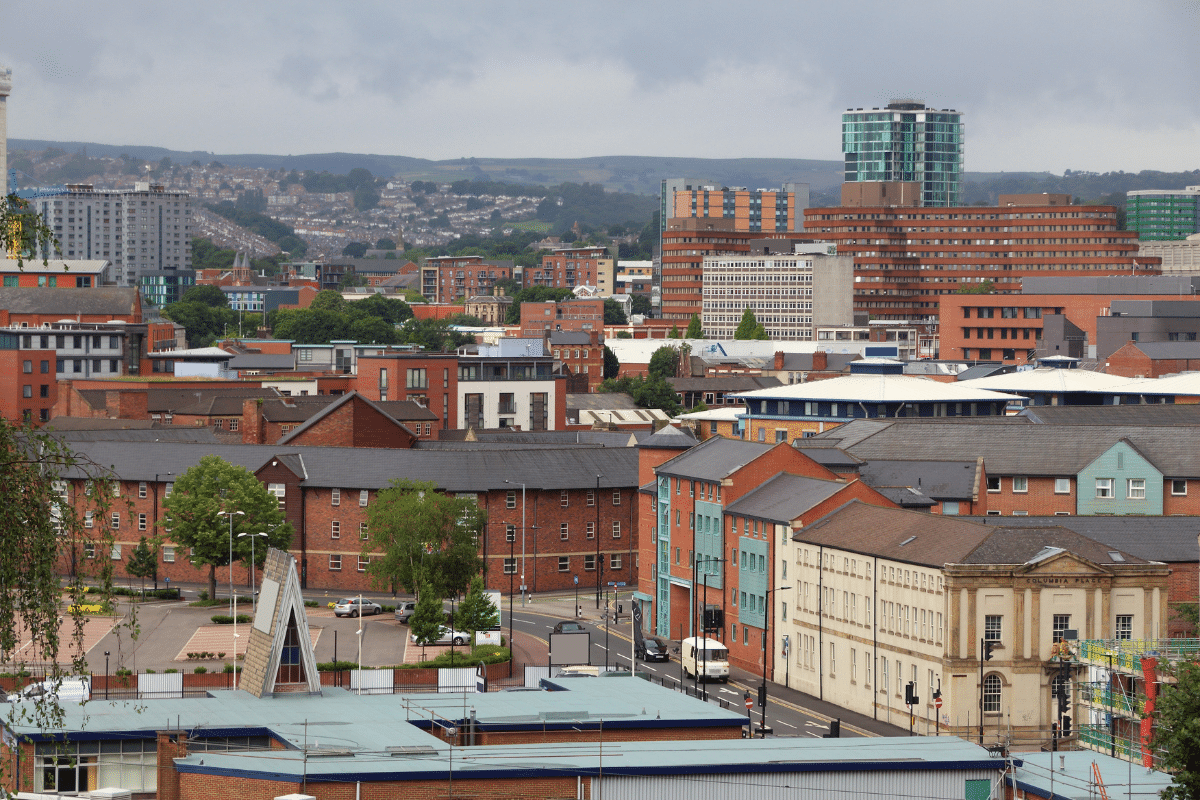The COVID-19 pandemic and its associated food distribution crises, food poverty and unemployment have demonstrated the need for alternative, more localised food-growing models in the UK, and this is no different in our city of Sheffield. In January 2021, 2.51% of the adult population in Sheffield were classed as hungry, with 8.1% struggling to access sufficient food and a further 11.43% experiencing worry around access to food. The figures for 2022 are yet to be revealed but are no doubt much worse. If we are to ensure that our community can feed itself delicious, nutritious, locally grown food, we need to turn our steel city into a green city over the next few years.
Sheffield’s Industrial Heritage
Sheffield has a remarkable industrial heritage, especially in the coal, steel and metalworking industries. It was a centre for steel makers and cutlers that created some of the world’s most fantastic tools and metal goods. However, forced deindustrialisation and the breaking of the miner’s strike in the 80s led to severe economic decline in South Yorkshire throughout the 90s, and Sheffield has failed to reestablish itself as a centre for industrial excellence. At ShefFood, we believe that the people of Sheffield should look to the future and create a new story for the city. Turning this once steel city into a green city that benefits people and planet will happen through expanding community greenspaces and creating a robust local food growing policy.
Turning from Steel to green
If we are to turn Sheffield from The Steel City to The Green City, we need to maximise food production and growing space in the urban and peri-urban environment. We also need to develop a circular economy that reduces, if not eliminates, waste within our economy. All of this will protect food access, reduce food insecurity, build a more resilient economy with better employment options and reduce our impact on the environment.
Grow Green Spaces
Sheffield is known for being one of the greenest cities in the UK; with over 100,000 trees in parks and open spaces, it has 10.4% woodland by area. While it may look green at a quick glance, there are still significant amounts of brown sites, suburbs and urban areas which lack green spaces and urban planting. Creating urban planting with both edible and decorative plants will increase biodiversity, reduce air and noise pollution and diminishes the risk of flooding. Not to mention, it looks a lot nicer than tarmac. The Grey to Green scheme in the old Castle Market area is the perfect example of planting to encourage wildlife and an innovative drainage system that saves 24,000 bathtubs’ worth of water from Sheffield’s sewage treatment works.
Increase urban farming
Urban and peri-urban farming allows more food to be grown in the city and on the fringes. This reduces food miles, increases access to fresh produce and encourages more local food production in the area. However, traditional agricultural setups require vast amounts of land for single crop production (such as wheat fields) and can have a terrible impact on the planet through soil erosion and pesticide use. If Sheffield is to be a green growing city, it needs to use alternative growing methods such as permaculture that use unusual space and provide healthier growing environments in the long term.
While open fields and cleared land are essential, a great deal of production can take place on rooftops, walls, fences, sheds and window boxes if the right production system is in place. This may require the revision of building codes and regulations by city planners. It is essential to build bridges which enable urban farmers to be heard in official and policy circles and gain better access to resources. The most robust policies are developed through the participation of a diverse range of stakeholders and experts, including individuals who live and work in communities.
Reduce waste through community composting
It’s not all about pretty flowers and flowing food baskets though. To truly make Sheffield a green city, we need to process waste in an environmentally conscious way that benefits the community. Dealing with food waste is a significant issue for all cities in the UK, but it can be a solution to reduce our carbon emissions as a city. As of 2023, Sheffield City Council will be offering kerbside collection on food waste. This excellent resource could be diverted from landfill, where it produces hazardous methane, into community composting efforts. This reduces the greenhouse gases food waste releases and provides low-cost compost material which could be used in parks, farms and community gardens throughout the city. This ideal circular process eliminates food waste and feeds the community further when used to replenish the soil in our urban growing spaces. It’s the perfect addition to take Sheffield from an industrial city to a green one.
Join the #ShefToSilver Campaign
ShefFood wants to take Sheffield from steel to green through our #ShefToSilver campaign. This campaign is part of the strategy to win Sheffield a Sustainable Food Places Silver award. Having won the Bronze award in 2020, they are confident they can take the city from steel to silver with the help of food organisations across the city. We have already signed up over 50 partners throughout Sheffield but want every possible food organisation on board. Check out their website for more information about the #ShefToSilver campaign, Sheffield Food Charter and what it means to become a partner.

